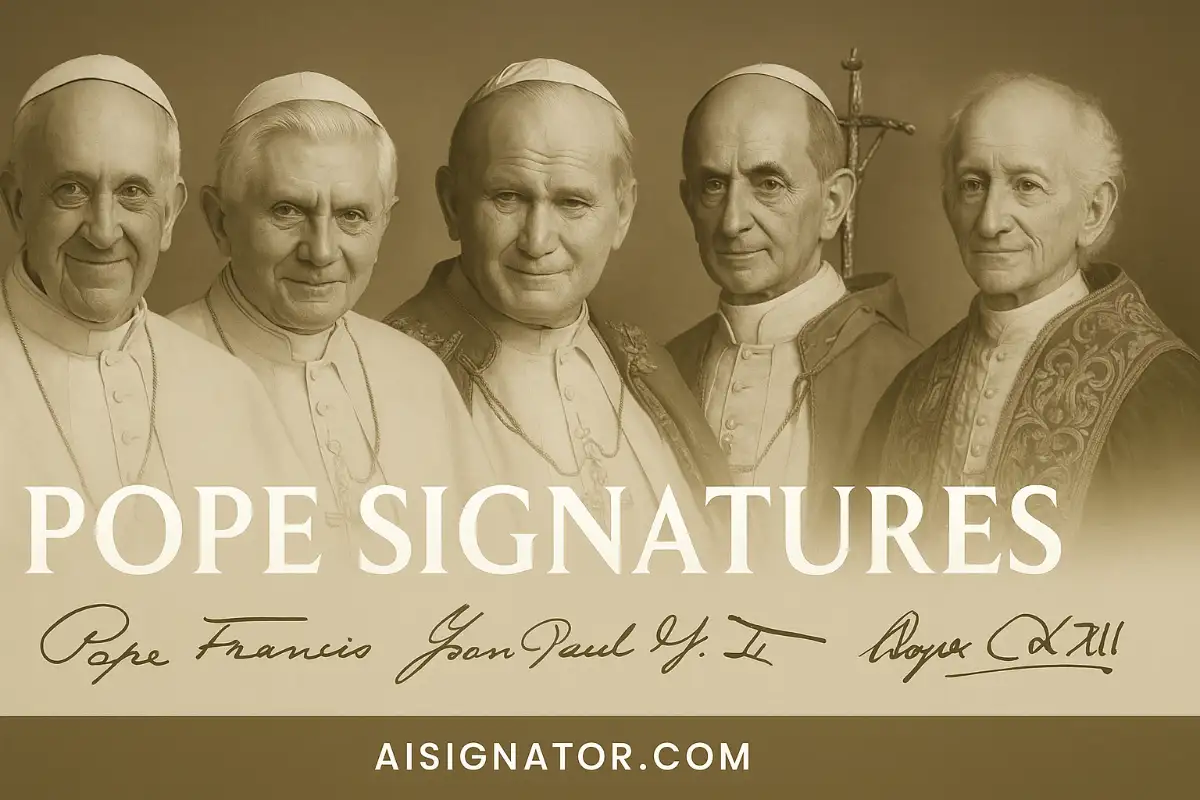🕊️ Introduction
The Roman Catholic Church has existed for over two millennia, shaping global civilization through its teachings, moral authority, and centralized structure. At the heart of this vast institution stands the Pope, the Bishop of Rome and spiritual leader of more than 1.3 billion Catholics worldwide.
Since the early Christian centuries, the papacy has evolved from a persecuted role into the most powerful religious office in the world. Each pope leaves behind a legacy not only of doctrine and leadership — but also of handwritten marks that reflect their personal identity, era, and theological tone.
To date, there have been 267 popes, beginning with Saint Peter, the apostle, considered the first pope by tradition. However, only modern popes (roughly from the Renaissance to the present) have left behind verified handwritten signatures. These autographs, used on papal bulls, letters, or personal notes, are now studied, collected, and revered for their historical and spiritual significance.
This infographic presents a visual timeline of significant Popes throughout Catholic Church history, highlighting their names, periods of service, and major contributions or historical contexts. It serves as a concise educational guide for those interested in papal history, the evolution of the Vatican’s leadership, and the impact of key pontiffs on global Christianity.
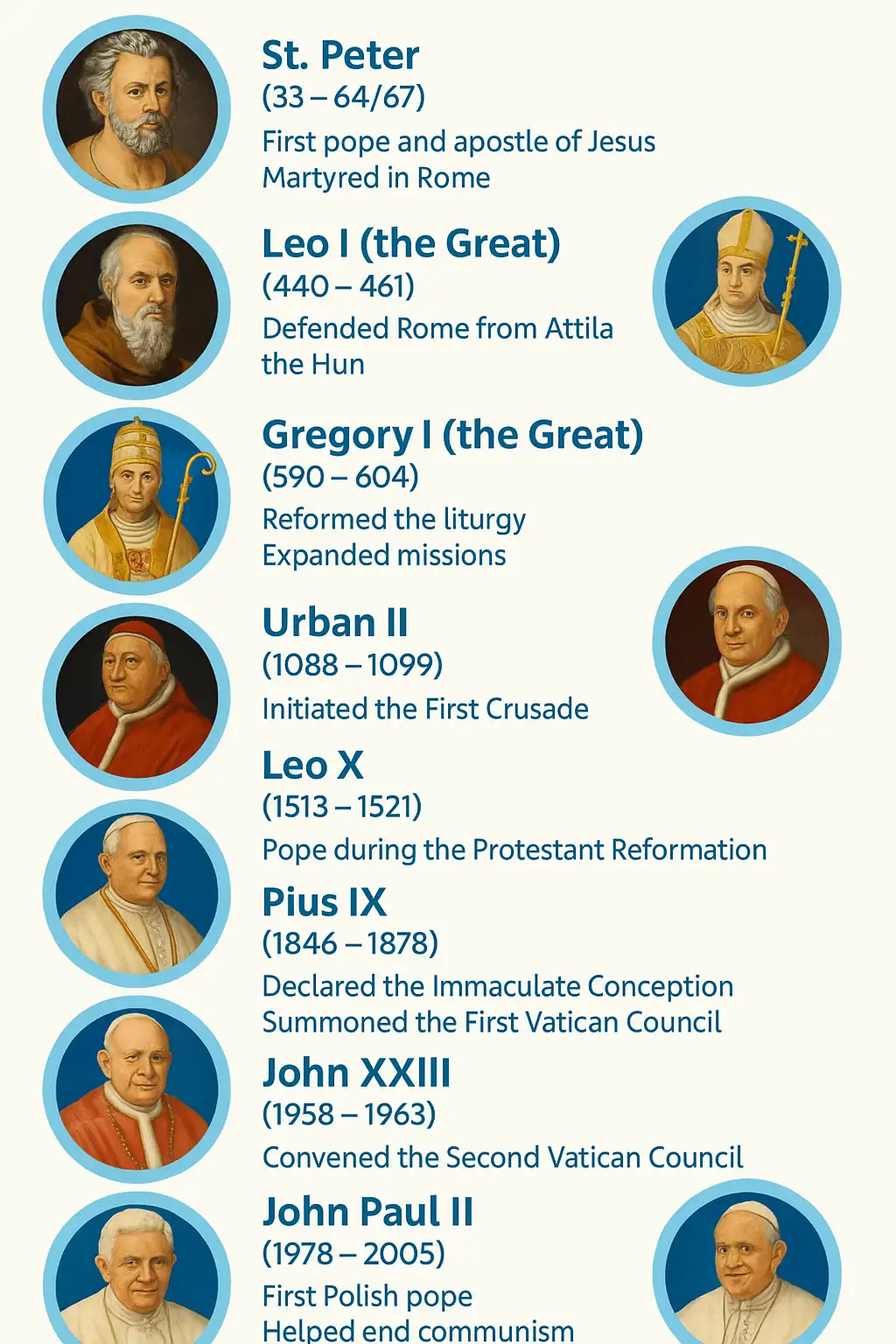
✍️ The Meaning Behind a Pope’s Signature
A pope’s signature carries unique weight. It’s more than an administrative mark — it’s a spiritual imprint of a leader entrusted with guiding the world’s largest Christian communion.
What makes it significant?
- Authority: Papal signatures often appear on encyclicals, official decrees, and canonizations — giving them ecclesiastical and legal force.
- Humility vs. Power: While some popes signed with their full title, others preferred modest expressions like “Servus Servorum Dei” (Servant of the Servants of God).
- Symbolism: Many autographs include crosses, blessings, or Latin forms that reflect the theological stance or tone of a given pontificate.
Want to impress others with a signature that reflects your best traits? First, understand your current one with our expert Signature Analysis tool.
✨ 15+ Famous Pope Signatures in Modern History
Below is a curated list of popes from the last few centuries whose signatures are well-documented, visually preserved, and often studied or collected.
Pope Leo XIV
- Born: September 14, 1955, in Chicago, Illinois, USA
- Pontificate: Elected on May 8, 2025
- Birth Name: Robert Francis Prevost
- Religious Order: Order of Saint Augustine (O.S.A.)
- Nationality: American and Peruvian (dual citizenship)
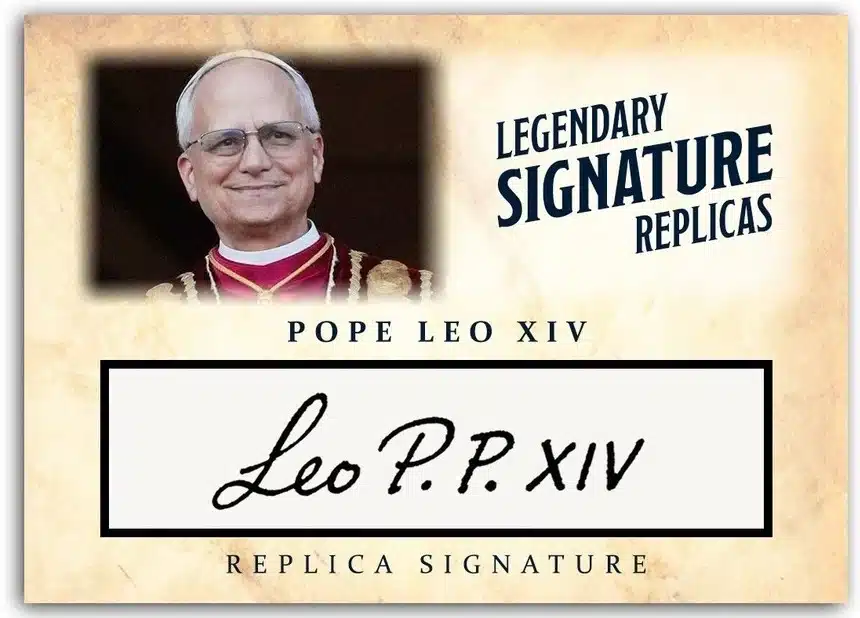
Pope Leo XIV is the first American and the first Augustinian to ascend to the papacy. Before his election, he served as the prefect of the Dicastery for Bishops and president of the Pontifical Commission for Latin America.
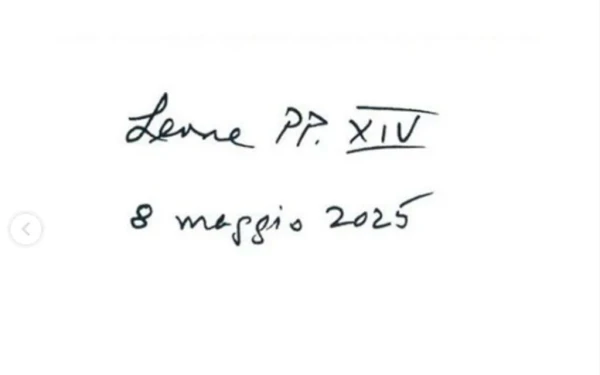
His extensive missionary work in Peru and leadership within the Vatican highlight his commitment to pastoral care and ecclesiastical governance. Known for his humility and dedication to social justice, Pope Leo XIV aims to continue the inclusive and compassionate vision of his predecessor, Pope Francis.
The newly appointed Pope Leo XIV has revived traditional papal elements in his elegant autograph.
✒️ Explore the meaning and design of the signature of Pope Leo XIV in this exclusive deep-dive.
Pope Francis
Born: 1936 (Argentina) | Pontificate: 2013–2025
The first Jesuit and Latin American pope, Francis’s signature is simple yet flowing — reflecting his pastoral approach, emphasis on humility, and accessibility.
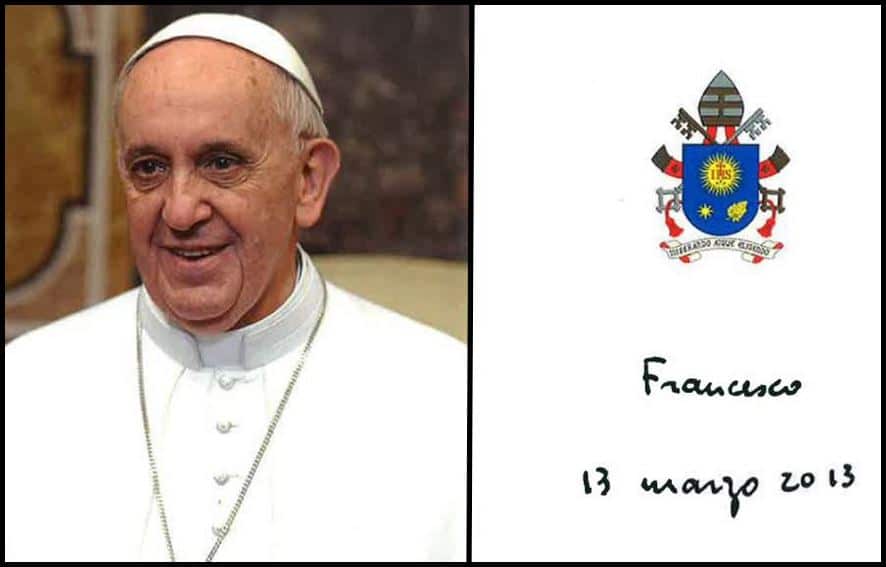
Pope Benedict XVI
Born: 1927 (Germany) | Pontificate: 2005–2013
Known for theological precision, his signature is refined, formal, and consistent with his academic rigor and reserved personality.
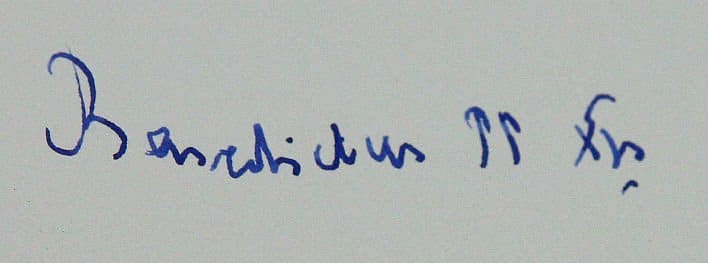
Pope John Paul II
Born: 1920 (Poland) | Pontificate: 1978–2005
One of the most traveled and beloved popes, his signature often included sweeping flourishes — symbolizing his dynamic energy and global outreach.
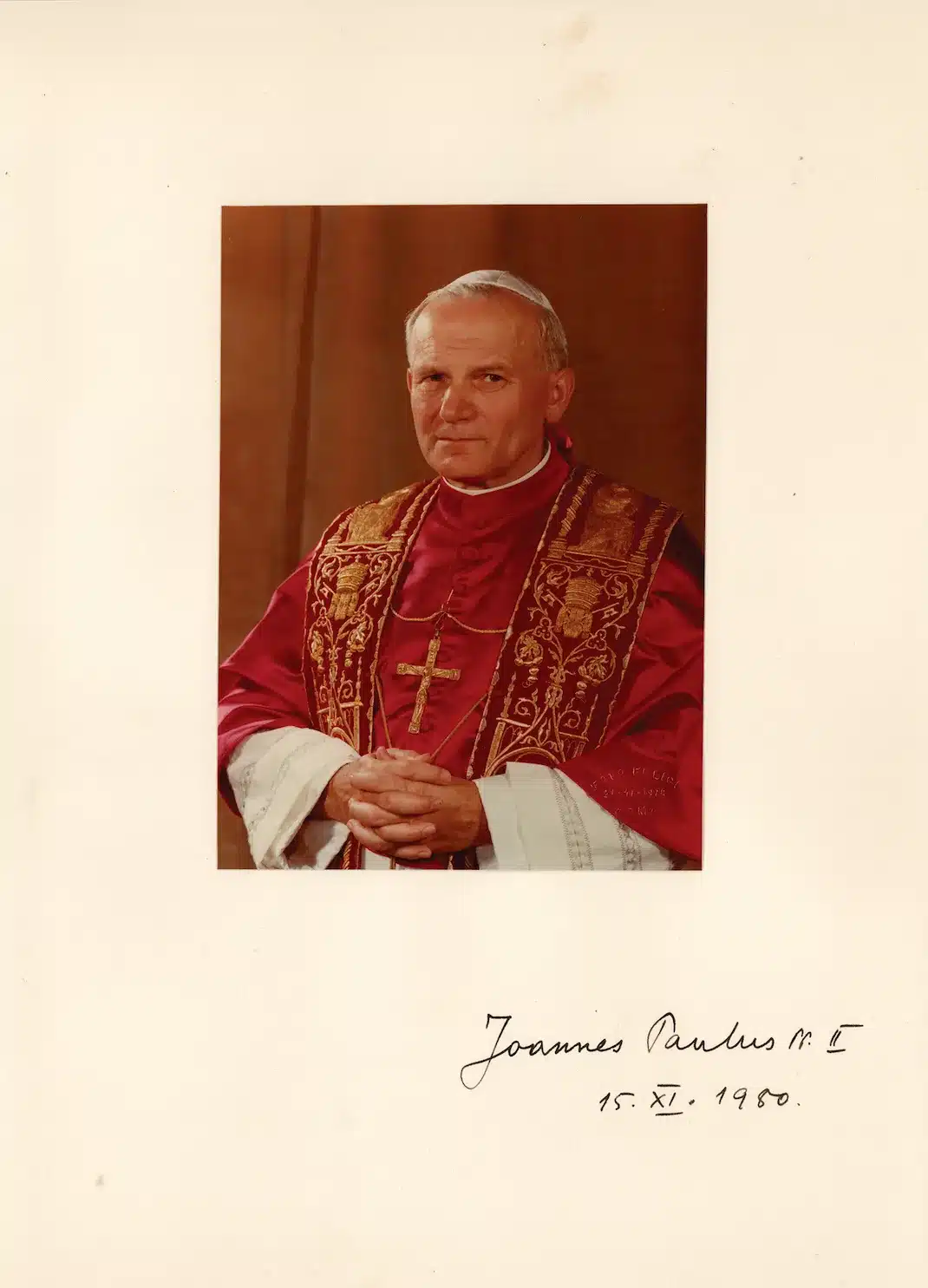
Pope John Paul I
Born: 1912 (Italy) | Pontificate: 1978 (33 days only)
His signature was modest and elegant. Though he served briefly, it’s a collector’s gem due to rarity and tragic brevity of his reign.
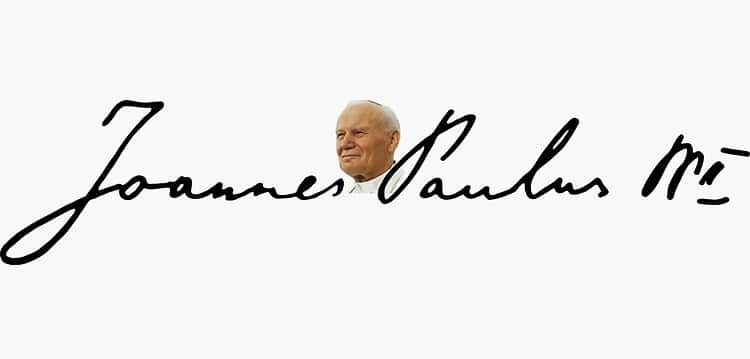
Pope Paul VI
Born: 1897 (Italy) | Pontificate: 1963–1978
His signature shows balance and structure — mirroring his work guiding the Church through Vatican II reforms and modernity.
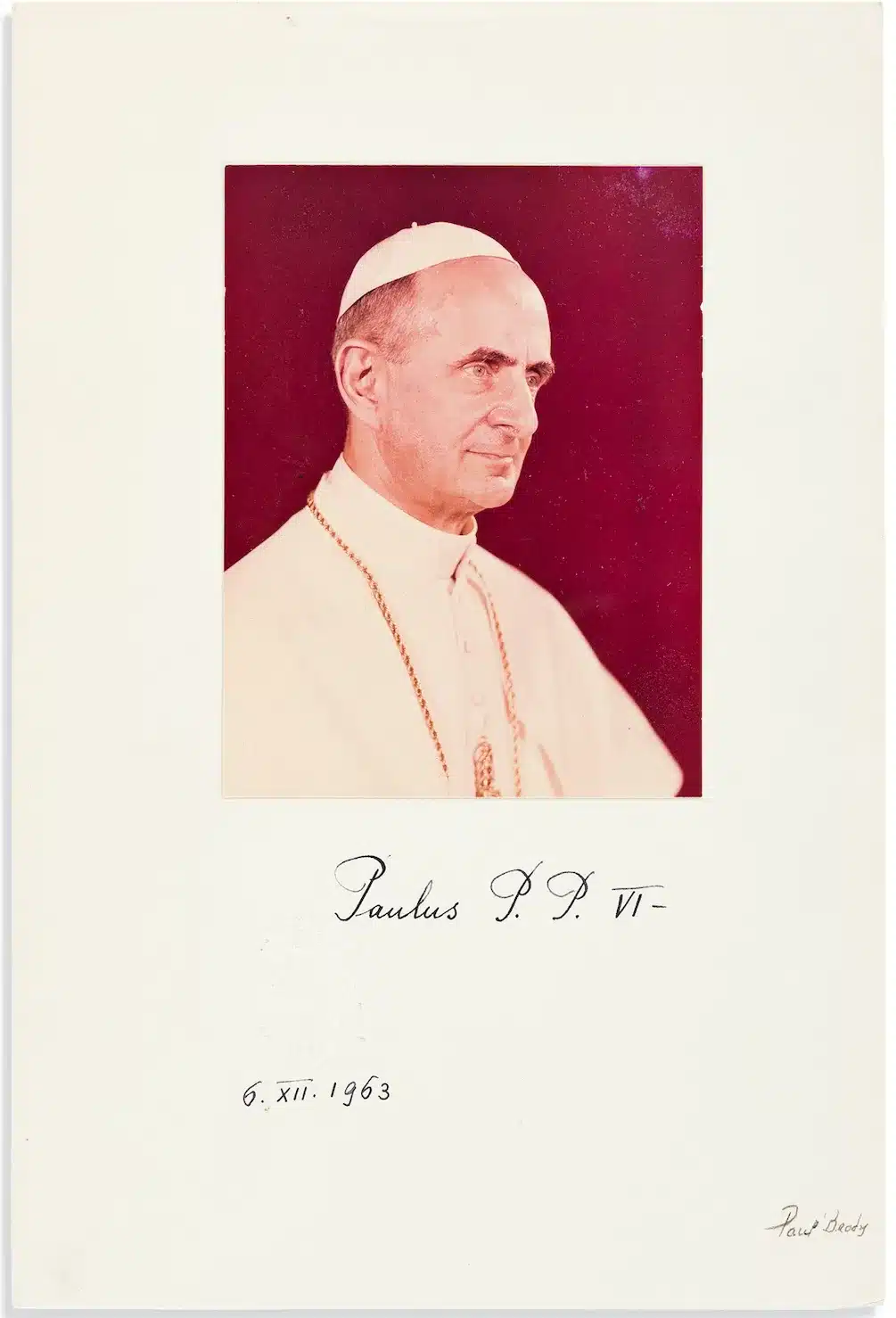
Pope John XXIII
Born: 1881 (Italy) | Pontificate: 1958–1963
Known as the “Good Pope,” his handwriting carried warmth. His signature reflects his pastoral heart and openness to reform.

Pope Pius XII
Born: 1876 (Italy) | Pontificate: 1939–1958
Pope during WWII, his signature is formal and upright — revealing his diplomatic background and gravitas under historical pressure.
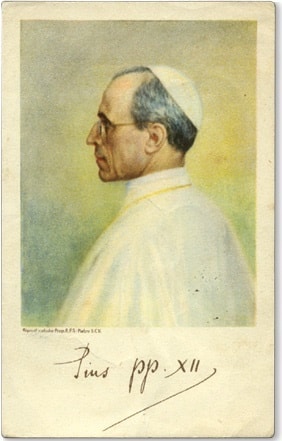
Wondering how to make your signature more meaningful?
Our Christian Signature guide offers tips, examples, and a free tool to help you design yours.
Pope Pius XI
Born: 1857 (Italy) | Pontificate: 1922–1939
His bold, assertive script conveyed conviction, particularly during rising fascist threats in Europe.
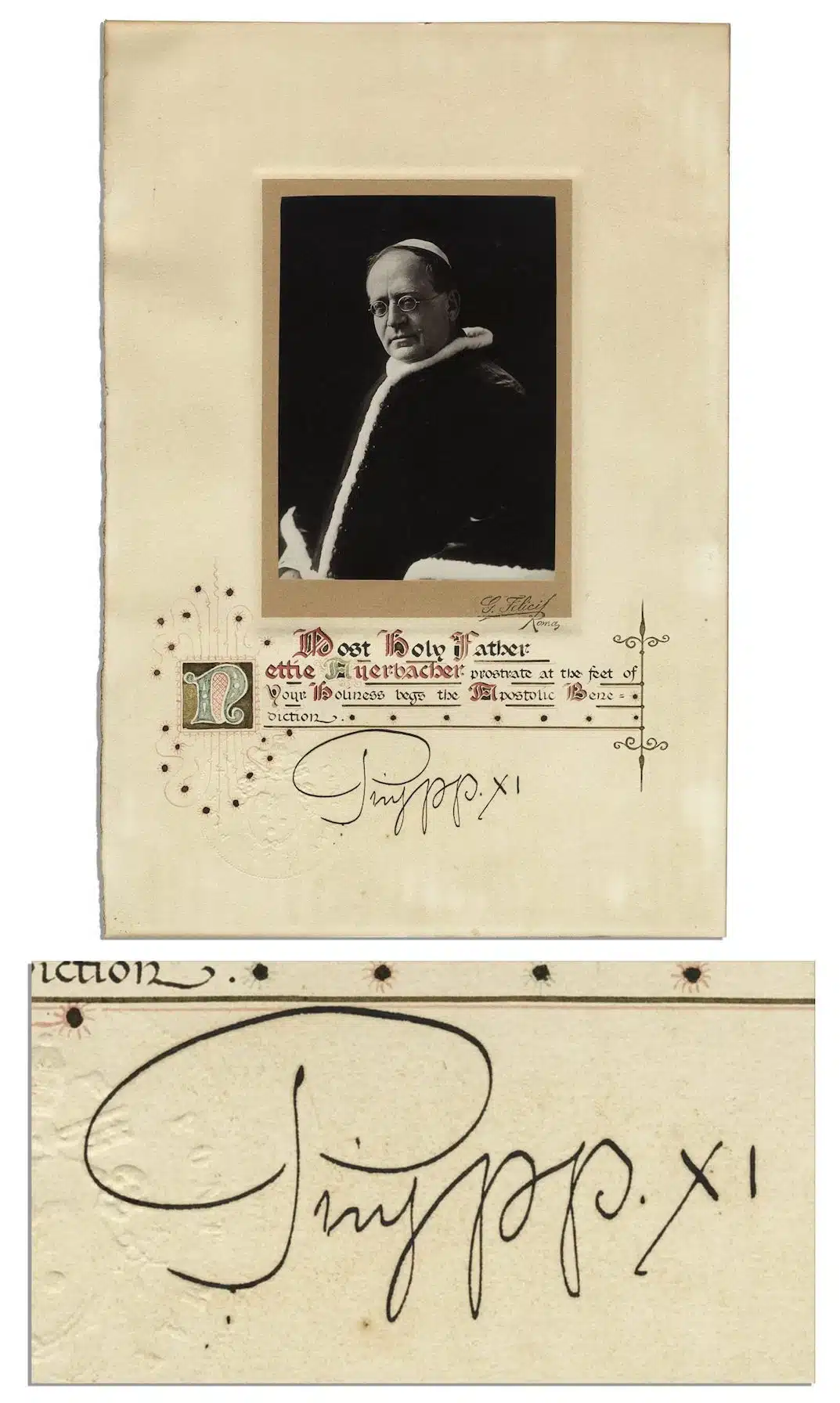
Pope Benedict XV
Born: 1854 (Italy) | Pontificate: 1914–1922
Signed with grace and restraint. Known for humanitarian efforts during WWI, his signature echoes quiet strength.
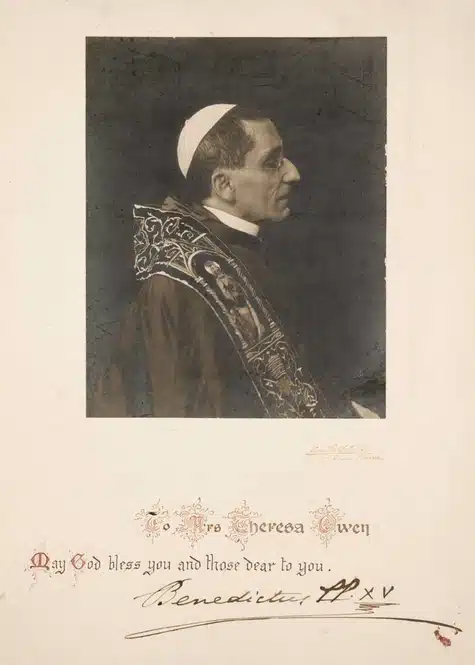
Pope Leo XIII
Born: 1810 (Italy) | Pontificate: 1878–1903
His long papacy left behind hundreds of documents. His autograph is dignified, curving gently — matching his poetic and intellectual tone.
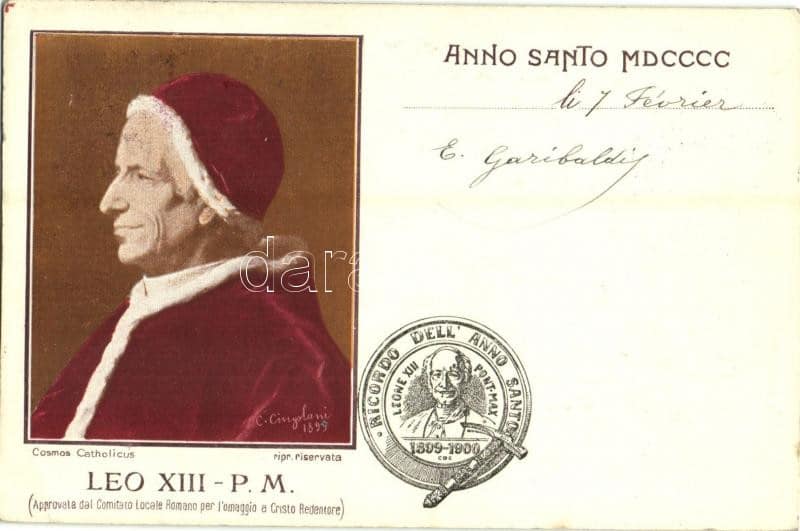
Pope Gregory XVI
Born: 1765 (Italy) | Pontificate: 1831–1846
One of the last popes before major modern reform. His signature is baroque and stylized, reflecting the formalism of the 19th-century papacy.
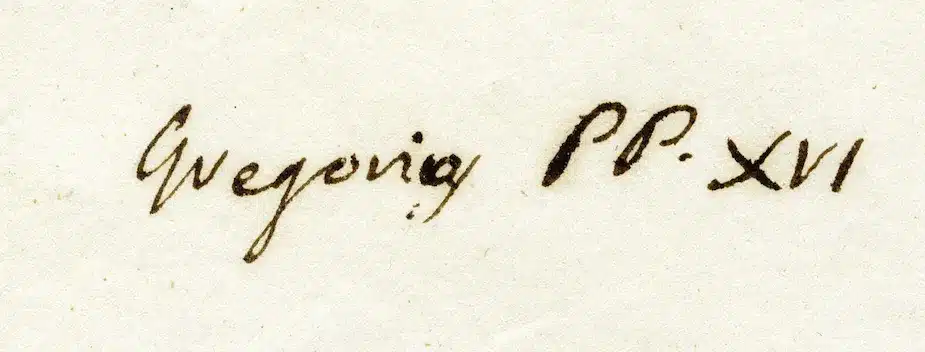
Pope Pius IX
Born: 1792 (Italy) | Pontificate: 1846–1878
The longest reigning pope in history. His signature evolved from youthful ornamentation to steadier lines — reflecting political upheaval and spiritual resilience.
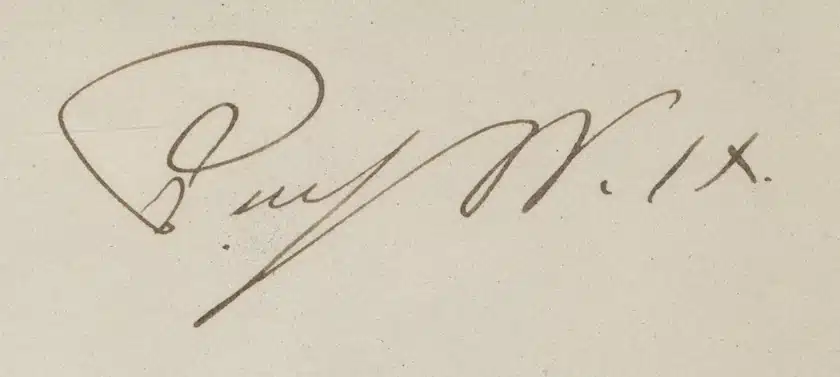
Pope Innocent XIII
Born: 1655 (Italy) | Pontificate: 1721–1724
Although earlier than most listed, samples of his signature exist on preserved Vatican letters. His handwriting reflects the papal court culture of the time — elegant but rigid.
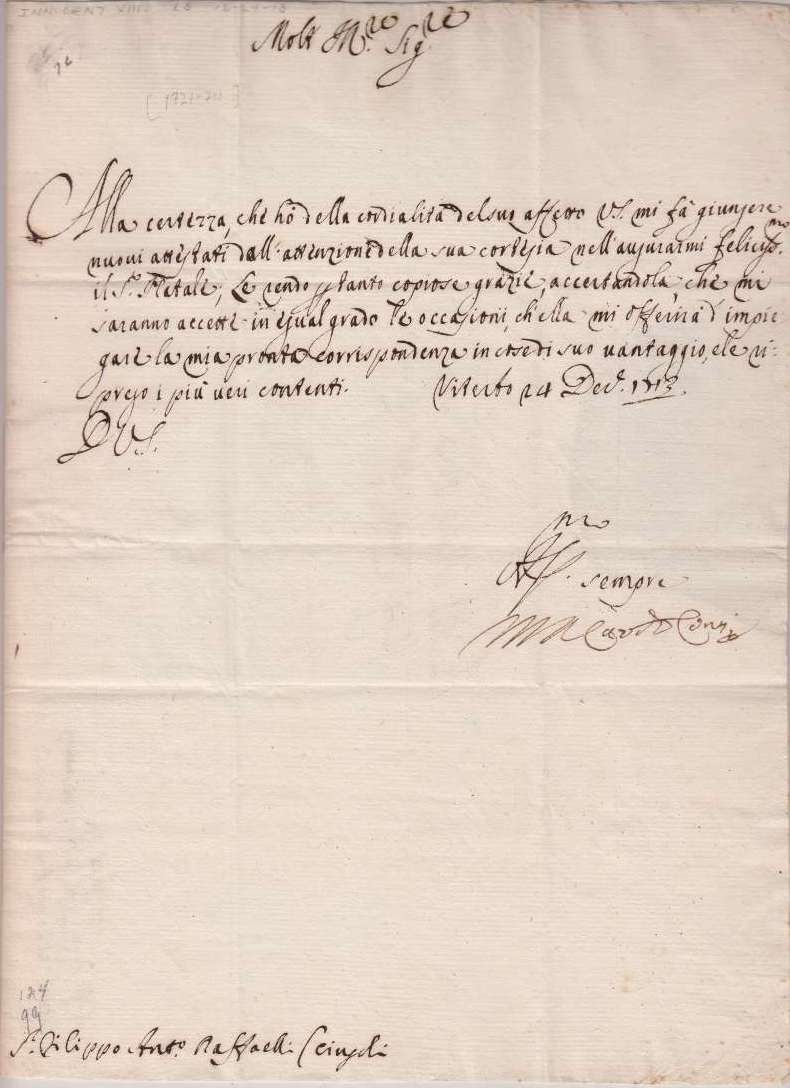
Pope Clement XIII
Born: 1693 (Italy) | Pontificate: 1758–1769
His signature combined symmetry with flourish — reflecting the baroque papacy before Enlightenment tensions challenged the Church’s structure.
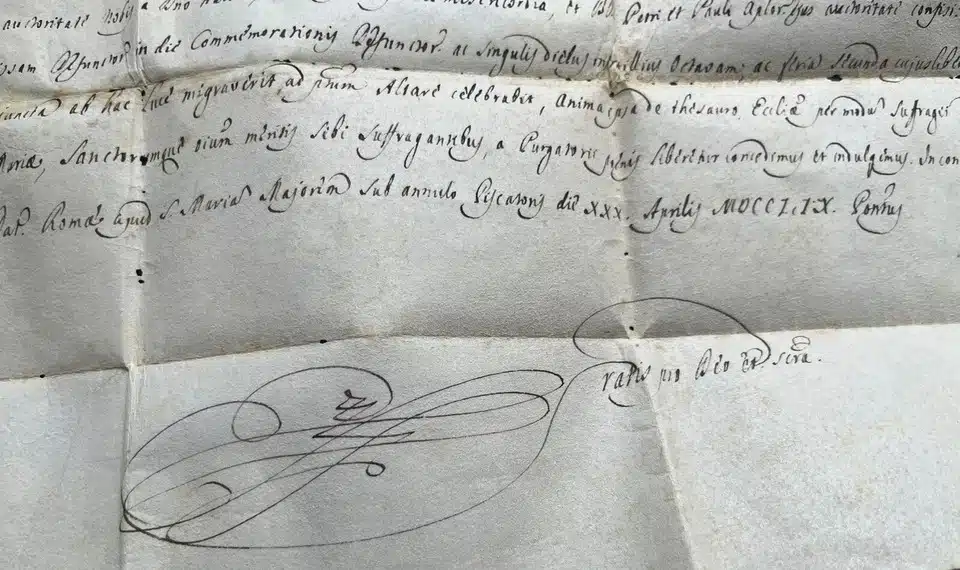
Pope Alexander VII
Born: 1599 (Italy) | Pontificate: 1655–1667
Known for architectural patronage (e.g., St. Peter’s Square), his autograph is refined and calligraphic — often seen on original building decrees and bulls.
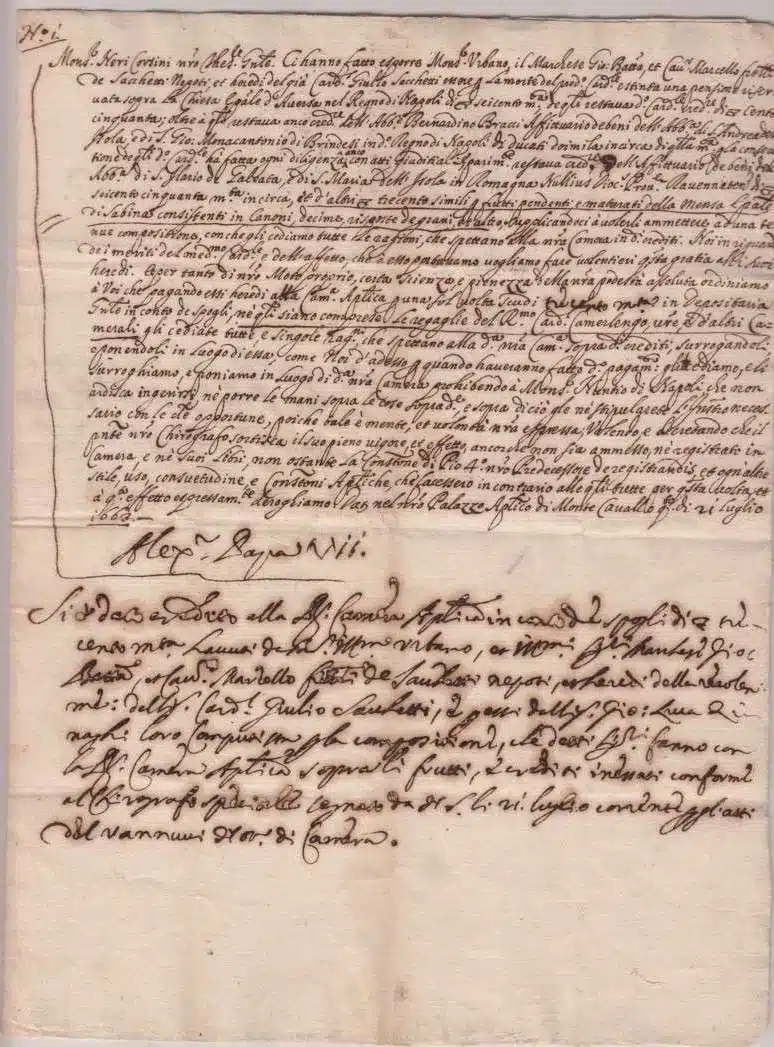
📜 Why Are Pope Signatures So Valuable?
- Religious authority: Signatures on official bulls, canonizations, and theological writings make them sacred records.
- Historical context: From wars to reforms, papal handwriting often intersects with world events.
- Collector value: Authentic papal signatures — especially handwritten letters or signed photos — can be worth thousands in auctions.
- Spiritual reverence: Some believers treat papal autographs as devotional relics.
🛠️ Try a Pope-Style Signature Generator
If you’re inspired by the historical flair and gravitas of papal handwriting, try designing your own signature in that style!
Use our Free Signature Generator to experiment with elegant loops, Latin scripts, or cross-inspired embellishments.
Perfect for fun, calligraphy, or liturgical-themed designs.
❓ FAQ About Pope Signatures
1. Are all pope signatures personally handwritten?
- Not always. While some popes personally signed key letters or blessings, most official documents (papal bulls, encyclicals) are either stamped with a facsimile or signed by Vatican secretaries.
2. Can anyone request an autograph from the current pope?
- Technically yes — but responses from the Vatican typically include pre-stamped blessings or printed messages. Personal handwritten notes from the Pope are extremely rare and usually reserved for diplomats or exceptional cases.
3. Which pope’s signature is considered the rarest or most valuable?
- Pope John Paul I’s signature is among the rarest due to his brief 33-day papacy. Additionally, early modern popes like Clement XIII or Innocent XIII have high collector value.
4. Do pope signatures change based on their roles?
- Yes. Some popes used different versions of their signatures before and after becoming pontiff. Their chosen titles, use of Latin, and stylistic choices often reflect their spiritual vision or personal humility.
5. How do collectors verify authentic pope signatures?
- Authenticity is confirmed through provenance, historical documents, expert handwriting analysis, and auction house certification. Vatican archives also serve as valuable references.
✨ Legacy in Ink: Why Papal Signatures Matter
From Saint Peter’s first followers to Pope Francis’s global outreach, the signature of a pope reflects both sacred office and human individuality. These autographs are not merely calligraphic expressions — they are fragments of history, identity, and divine mission.
To study them is to see the weight of centuries condensed into a stroke of ink.
🌟 New Ideas to Personalize Your Signature

